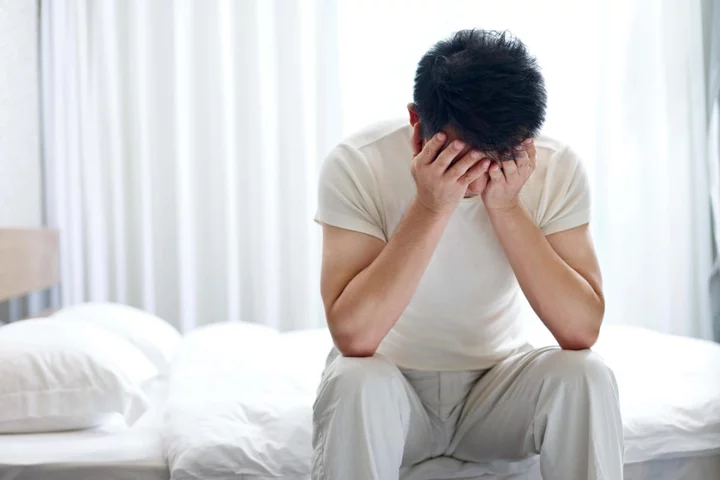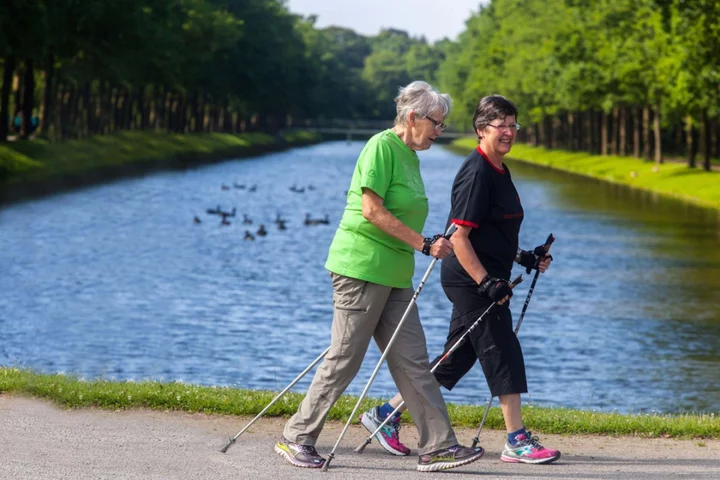
Mick Jagger, father of eight, explains why parenting is ‘not like riding a bike’
Father of eight Mick Jagger has shared some of the lessons he’s learned about parenting. The 80-year-old singer addressed how his approach to fatherhood has changed over the years during a recent interview with The Guardian. His eight children range from ages 52 to six years old, as he welcomed his youngest son, Deveraux, with his current girlfriend, Melanie Hamrick, in 2016. Speaking to The Guardian, Jagger confessed that even when he welcomed his eighth child, he still had a bit to learn about fatherhood. “You get a bit out of practice – it’s not like riding a bike,” he said. “The more children you have, the more laissez-faire you get about them, to be honest. And it depends on the child.” The Rolling Stones frontman reflected on how he’s enjoyed seeing his children develop new passions as they’ve grown up. However, he also acknowledged that there were a few moments in his children’s lives that he missed out on due to his busy career. “They have their own personalities and you can mould them to a certain extent, but you see their likes and dislikes and encourage them to do things they gravitate towards,” he said. “It’s fun to have children, at any age. But if you’re working and always away, you don’t get to enjoy it quite as much.” Jagger also explained why his approach to parenting is different with his youngest son, in comparison to his other children. “I wasn’t working so much, so I was able to spend more time. And then we had the lockdown – he’s only six, and two of those years I did almost nothing [with the band],” he said. In addition to Deveraux, Jagger has seven children from previous relationships. In 1970, Jagger welcomed his first child, Karis, 52, with actor Marsha Hunt. The next year, his ex-wife Bianca Jagger gave birth to their daughter Jade, 51. He shares daughters Elizabeth, 39, and Georgia May, 31, and sons James, 38, and Gabriel, 25, with actor Jerry Hall. In 1999, he and model Luciana Gimenez Morad welcomed their son Lucas, 24. This isn’t the first time that Jagger has spoken candidly about his family. Last month, he hinted that the Rolling Stones’ post-1971 catalogue would be donated to charity rather than sold for a profit to his children. “The children don’t need $500m [£412m] to live well. Come on,” Jagger told The Wall Street Journal. “You may do some good in the world,” the “Old Habits Die Hard” singer added, suggesting that the catalogue may end up going to charity. Earlier this year, his partner opened up about raising their six-year-old in the midst of her busy schedule. After debuting her first novel, titled First Position, Hamrick described some of the “magical” trips she’s taken with her partner and son, including a safari in Botswana and South Africa. She told The Times in June: “Mick had been joking with me, ‘We’re going camping.’ I was like, ‘I don’t want to go camping. I’m not a camper.’ We got there and I was like, ‘This isn’t camping.’” She described how her family prefers to live at different residences at a time, before acknowledging how important travelling is to her and Jagger. “Just full nomad. We want to travel as long as we can until school gets us,” she said. The former dancer also noted that her child has a tutor who travels with them, as the six-year-old is enrolled in a school in Los Angeles and “goes [to school] a little bit when we’re in France”. Read More Should we stop putting the clocks back? What the experts think Like Rebecca Adlington, I also lost my baby at 20 weeks As Rebecca Adlington shares heart-breaking miscarriage news: How to support others experiencing baby loss
2023-10-25 05:15

JetBlue Wants to Kick KLM Out of JFK If It Loses Amsterdam Airport Access
JetBlue Airways Corp. asked US authorities to bar Dutch carrier KLM from New York’s John F. Kennedy International
2023-10-24 22:26

Pulitzer, Amsterdam hotel review: Luxury, local cuisine and decadence in this Dutch period piece
In a nutshell: In Amsterdam’s oldest five-star hotel, no two rooms are the same, restaurants serve up local cuisine, and a 1909 saloon boat offers tours of the city’s canals. The neighbourhood Amsterdam attracts visitors from all around the world thanks to its rich history, eclectic museums, bike lifestyle and coffee shop culture. The city is wonderfully walkable and the five-star Pulitzer hotel places you in prime location to explore all the Dutch capital has to offer. Looming over the canal belt and in the heart of the historic Nine Streets neighborhood (right out of a Wes Anderson movie), this quintessential district is brimming with boutique shops, charming cafes and enticing restaurants. Located five minutes down the canal, you’ll find Anne Frank’s house while the Museumplein (home to Rijksmuseum, the Van Gough museum and Moco), Amsterdam Centraal and Vondelpark are a mere 20 minute walk away. If you’re keen to cycle like a local, the hotel is equipped with Pulitzer bikes and the erudite concierge Ron Stoevelaar is on hand to show you the best routes. The look Set within 25 Golden Age canal houses, the Pulitzer forms an entire block in the Nine Streets area. Founded in 1970 by Peter Pulitzer (grandson of the Pulitzer Prize founder Joseph Pulitzer), the hotel went through a £1.5 million restoration in 2016. The hotel combines 17th century Dutch elements and mid-century design (think beamed ceilings, historic fireplaces, period antiques and an impressive collection of art, books and music) with contemporary features. Every nook (and there’s many) of the hotel offers a glance into the past – whether it’s in the library of Pulitzer Prize winning books, the lobby with Persian rugs and paintings or in the four luxury collectors suites. Exemplifying the old meeting the new, look out for what appears to be a 17th century painting of a floral bouquet in the lobby. A closer look will reveal it to be a photograph of melted cutlery by a contemporary artist. The vibe Oozing elegance and class, the Pulitzer’s architectually impressive buildings are enriched with antique pieces and Dutch design details. A beguiling space, the grand lobby has a buzzy atmosphere thanks to the laid-back Pulitzer Garden bar and eatery that are tucked away toward the back, while the check-in and concierge desks are warm and welcoming. Upon arrival, you’ll spy an eclectic clientele of 30-somethings talking over old fashioned cocktails at the bar, upmarket travellers in the mid-century armchairs, older couples chatting to the concierge and families feasting in the lobby’s Italian-inspired restaurant. Stepping out of the Pulitzer doors and onto the canal side, picturesque Amsterdam – without the chaos of the main streets – is on your doorstep (just try not to collide with any of the bikes swishing past). Bed and bath Despite being home to more than 200 rooms, the hotel has a cosy, boutique feel owing to the canal house layout and warren of mood-lit interlocking corridors (there’s much enjoyment to be had in getting lost in the Pulitzer). Each room is unique and inspired by an aspect of Dutch design. With themed-collectors suites, family size spaces and canal-view rooms – as well as generous, cosy and classic spaces available – there’s a room to suit every kind of traveller. Featuring decadent marble bathrooms (complete with luxury Debaser toiletries and well-pressured power showers), the rooms boast custom made headboards, a work desk with a mirror, mid-century drinks trolleys and chaise lounges. Thoughtful details such as bookshelves, a bike repair kit, an umbrella, French press and Dutch sweet treats all elevate the space, while windows either look out over the canal, the street below or the Pulitzer garden in the centre of the hotel. You can opt in or out of having your sheets changed each morning – the hotel reminds you of the importance of saving water – by placing a card on your bed. Food and drink There are two restaurants on site at the Pulitzer: the all-day dining eatery Jansz and the more laidback Pulitzer Garden restaurant. The former favours locally-sourced ingredients and classic Dutch cuisine, with the lunch and dinner line-up brimming with seasonal small plates, freshly caught fish dishes (the shrimp croquettes and octopus were a delight) and refined classics like burgers and steaks. Jansz is also where breakfast is served, with guests able to order a la carte (the omelette is a must) or try the continental buffet. Open for breakfast, lunch and dinner, the Pulitzer Garden has indoor and outdoor tables with a hearty menu inspired by Italian cuisine – think aubergine parmigiana, lobster spaghetti and chicken caesar salad. After dinner, be sure to head to the glamorous and deliciously moody Pulitzer Bar. Sink into the armchairs, sofas and bar stools to while away the evening with signature or classic cocktails (try the breakfast margarita and new Amsterdam). Public areas The neighbourhood-style complex includes the Jansz restaurant, Pulitzer Garden bar, restaurant and garden seating, the Pulitzer Bar and the resplendent lobby. Whether you’re a guest or not, the Pulitzer bar is a must-visit. Elegant and free from the havoc of city centre bars, the Art Deco-style bar looks over the canal and is the perfect spot for people watching. Open to guests, there’s also a 24-hour gym at the Pulitzer with machines, yoga mats, weights, towels and chilled water. When visiting the Pulitzer, you’ll notice two gleaming boats docked in front of the hotel. The Tourist (which famously took Winston Churchill on a trip through the city in 1946) and the smaller Belle are available for private and group tours for guests and the public at an extra cost. Built at the beginning of the 20th century, the interiors are complete with polished teak and brass, luxurious carpeting, marble, leather and original bevelled glass. Lasting 90 minutes, the concierge’s guided cruises take you on a whistlestop tour of the city’s canals – and there’s a self-service mini bar for on-board drinks. Nuts and bolts Room count: 225 Freebies: Breakfast at Jansz restaurant (if included in your booking); gym access; Pulitzer tote bag; Pulitzer card deck; welcome stroopwafels; coffee or tea in the room. Wifi: Free. Extra charges: Room service; additional beds for children; pets. Disability access: There are fully fitted accessible guest rooms available to reserve. Pet policy: A small dog or cat is allowed in rooms at a cost of €50 per day. Bottom line Best thing: Impeccable service, prime location for exploring the city, excellent restaurants and an intimate bar. Worst thing: Some might not get on with the thin doors and walls in the bedroom (it is an old building after all), meaning you can occasionally hear movement in the corridor. Plus, we would have liked to see slightly more reasonable prices in the otherwise more laidback Pulitzer Garden restaurant. Perfect for: Upmarket travellers, foodies, couples and families. Not right for: Those after a budget city break. Instagram from: The moody Pulitzer bar, canal-view room, The Tourist boat tour or Jansz window tables. Room rate: Double rooms from £351 a night. Read more of our hotel reviews: The elegant Landmark Hotel London Luxury hotel meets B&B at The Dante House The Ritz-Carlton, Abama hotel review Read more on Amsterdam travel: Amsterdam travel guide: Best things to do Best hotels in Amsterdam Everything British tourists shouldn’t do in Amsterdam Read More Independent Traveller guide to best hotels and short breaks Best UK hotels 2022 Best hotels in Paris for 2023 Amsterdam travel guide: Best things to do and where to stay for a 2023 city break The best holidays to book for November, from winter sun in Oman to Scandi Christmas markets Best hotels in Europe 2023: Where to stay for a city, beach or retreat break
2023-10-24 04:55

As Rebecca Adlington shares heart-breaking miscarriage news: How to support others experiencing baby loss
Rebecca Adlington said she is “truly heartbroken” after suffering a late-stage miscarriage. The double Olympic gold medal swimmer found out about the devastating loss at a routine 20-week scan, sharing the news in a post on Instagram yesterday evening. “I don’t really have the words right now but unfortunately we went for our 20 week scan this week and they found no heartbeat. I gave birth to our angel, Harper on Friday at 7pm. We held her, and had time with her. We will forever love her and remember her always,” Adlington, 34, said. After thanking staff at Wythenshawe Hospital for their “kindness and care”, she added: “I don’t have the strength or words right now and don’t feel ready to share this news. However, I can’t pretend to be ok or fake a smile. I can’t have people ask me how pregnancy is or when I am due as I still look pregnant. I don’t have the strength to tell this news individually. “We are so truly heartbroken. Our beautiful girl. Rest in peace.” Adlington – who shares son Albie, two, with her husband Andy Parsons and has an eight-year-old daughter, Summer, from her previous marriage with Harry Needs – previously revealed she’d had a miscarriage 12 weeks into her pregnancy last August, resulting in emergency surgery. And as her Instagram post this week highlights, one of the many difficult things about losing a baby is telling other people. So, how can people respond supportively when a friend, relative or colleague shares news of a baby loss? Showing empathy “It’s about showing empathy as much as you possibly can, showing some form of understanding, and really just being there to listen to them,” Rochelle Love, a midwife working with baby loss charity Tommy’s, told the PA news agency. A late miscarriage is one which happens between 14-24 weeks of pregnancy, and is less common than early-stage miscarriage, occurring in an estimated 1-2% of pregnancies, Love explained. “We don’t always know why these miscarriages happen. They can be for a multitude of reasons, and the sad thing for expectant parents is that we may not always find a definite cause,” she added. “It may not necessarily be related to previous miscarriage.” Take care with ‘helpful’ comments Friends and family may try to comfort someone who’s lost a baby with well-meaning but sometimes way off-the-mark ‘helpful’ comments. Love said it’s crucial to be very careful about what you say. “I don’t think it’s ever up to us to make assumptions, and especially do not make comments like: ‘Don’t worry, you can have another baby’, ‘Don’t worry, you can try again’, or, ‘You were only 20 weeks pregnant’,” Love advised. “I think sometimes people just don’t know what else to say, so they make these throwaway comments, which are not necessarily the best things to say when someone’s grieving. It’s not up to us to say [these things] – how do you know, for example, that they can have another baby? Think about what you’re going to say before you speak to someone who’s had a loss.” Be mindful of terminology Remember this isn’t just a foetus to the grieving parents – it’s their child, and it can be very important to talk about it as such. Love said: “Address the baby as their baby, and if the baby has a name, then use it. Be very careful of the words you use.” Be there for them Instead of offering up platitudes, Love said it’s often better to just let people know you’re there if they need you. “Just let them know you’re there for them – you’re there if they want to speak, or if they just want to sit in silence – you’re available to be their support if and when they should need it,” she explained. Don’t forget their partner Love stresses that any kind of support needs to be extended to the partner as well. “Sometimes the partner is ignored and we just focus on the pregnant person, but the partner is the pregnant person’s closest support and they’ve also lost their baby and are also grieving,” she said. “I always advise anyone who’s had an unfortunate loss that if they decide to go for grief counselling, they should make their partner a part of that process as well, so they can go on that grief and healing journey together.” Remember everyone will grieve differently Loss and grief is experienced differently by everyone. “How I may grieve a pregnancy loss may be very different from how somebody else might grieve,” said Love – so it’s important to let people do things their way and at their own pace. Think about offering them helpIf you are close with them, offer practical help if you feel they may welcome it. Love said this could mean “getting someone’s groceries for them because they don’t feel they can face getting dressed and going out, or cleaning the house – anything at all could be very well received.” Tommy’s helpline is on 0800 014 7800 Read More What you need to know about new research into treating cervical cancer How to do Halloween make up and still take care of your skin Which houseplants best suit your star sign? 5 of the hottest new perfume launches for autumn/winter Consistent lack of sleep may increase risk of future depressive symptoms – study World Osteoporosis Day: The risk factors and early warning signs everyone needs to know about
2023-10-23 21:29

What you need to know about new research into treating cervical cancer
Using existing drugs to treat cervical cancer before standard treatment could lead to a 35% reduction in the risk of relapse or death, a new study suggests. Researchers from the UCL Cancer Institute and UCLH looked into whether a short course of induction chemotherapy (IC), where a drug is used to destroy as many cancer cells as possible, before chemoradiation (CRT), could help with this. Here’s everything you need to know about the findings… What is cervical cancer? According to the NHS website, cervical cancer is a type of cancer found anywhere near the cervix – the opening between the vagina and the womb (uterus), which is also known as the neck of the womb. Most cervical cancers grow very slowly and are caused by an infection from specific types of human papillomavirus (HPV) and mostly affect women under the age of 45. According to Jo’s Cervical Cancer Trust, symptoms include vaginal bleeding that is unusual to you, changes to vaginal discharge, discomfort during sex and pain in your lower back or pelvis. Changes to cells can be spotted by a cervical screening, and then treated before they turn into cancer. There are around 3,200 new cases every year in the UK, with the five-year survival rate being around 70%, according to Cancer Research UK. CRT has been the standard treatment for cervical cancer patients since 1999, but even though there have been overall significant developments in radiation therapy techniques, up to 30% of people experience their cancer coming back. What did the research involve? Over a 10-year period, 500 patients who had been diagnosed with cervical cancer – that was large enough to see without a microscope but hadn’t spread to other parts of the body – took part in the Interlace trial at hospitals in the UK, Mexico, India, Italy and Brazil. Researchers looked into whether a short course of IC before CRT could reduce rates of relapse and death. What results were found? After five years, researchers discovered that 80% of the people who received a combination of chemotherapy and radiotherapy were alive, whilst 73% had not seen their cancer return or spread. A major benefit, according to researchers, is that it can be incorporated into standard of care treatment relatively quickly, because cheap, accessible and already-approved ingredients such as carboplatin and paclitaxel are needed for IC. “Our trial shows that this short course of additional chemotherapy delivered immediately before the standard CRT can reduce the risk of the cancer returning or death by 35%,” said Dr Mary McCormack, lead investigator of the trial from UCL Cancer Institute and UCLH. “This is the biggest improvement in outcome in this disease in over 20 years. “I’m incredibly proud of all the patients who participated in the trial; their contribution has allowed us to gather the evidence needed to improve treatment of cervical cancer patients everywhere. “We couldn’t have done this without the generous support of Cancer Research UK.” Why is the research important? Dr Iain Foulkes, executive director of research and innovation at Cancer Research UK, said: “Timing is everything when you’re treating cancer. The simple act of adding induction chemotherapy to the start of chemoradiation treatment for cervical cancer has delivered remarkable results in this trial. “A growing body of evidence is showing the value of additional rounds of chemotherapy before other treatments like surgery and radiotherapy in several other cancers. “Not only can it reduce the chances of cancer coming back, it can be delivered quickly using drugs already available worldwide. “We’re excited for the improvements this trial could bring to cervical cancer treatment and hope short courses of induction chemotherapy will be rapidly adopted in the clinic.”
2023-10-23 20:22

Offset: Confidence is the sexiest thing Cardi B can wear
Rapper Offset says it was Cardi B's confidence that won him over.
2023-10-23 19:54

Naomi Osaka opens up about fighting thoughts that she ‘won’t be a good mom’
Naomi Osaka has reflected on battling self-doubt and difficult thoughts as a new mother. The four-time Grand Slam tennis champion gave birth to her first child, a daughter named Shai, in July 2023. She shares Shai with her partner, rapper Cordae. On Sunday (22 October), Osaka shared some insights into her personal life with her fans to mark turning 26 earlier in the week. In an extended post on X, formerly Twitter, the Japanese athlete wrote about taking stock of her life so far, and wondering whether or not she’s taken the “correct path”. “I often try to retrace my steps to figure out how did I end up here,” she explained. “I know I say this often but I truly still feel like that kid playing on public courts in Queens, NY. “Randomly I wonder if I’m doing OK, is there a correct path to take in life or have I veered off onto the scenic route for a little bit? However, I’ve now come into the mindset that I can only keep moving forward and everything that will be, will be.” Osaka then shared her specific feelings of worry about her capabilities as a parent. “Something I had to conquer recently is fighting the thought that I won’t be a good mom,” she wrote. “So many doubts raced through my head I had to swat them away like mosquitoes. “Looking into Shai’s eyes and holding her I always think, ‘Wow this little person depends on me so much, I have to do better.’ It’s such a strange feeling watching your kid grow, you blink and they’re double the size in a few months. “Gratefulness reminds me to breathe and take in the little things (and the big ones).” Osaka ended her post by expressing her gratitude for having “another year” and for the people who support her. Osaka’s last competitive match was at the Toray Pan Pacific Open in September 2022, before she withdrew from the tournament due to abdominal pain. She announced her pregnancy in January 2023 shortly after stating that she wouldn’t be competing in the Australian Open later that month. Last month, Osaka spoke about her year away from playing tennis and mentioned how other female tennis stars’ longevity has influenced her desire to keep competing. “The whole process, it felt long and short at the same time,” she told the American sports news channel ESPN. “When I stepped away, it was Tokyo, that was the last tournament I played. I just remember watching the Australian Open and being very devastated, because I’ve never missed an Australian Open. “When I was watching Serena and Venus [Williams], I was thinking, ‘Ah, I probably no way will ever play at their age’, but sitting here, I’m like, ‘You know what? I might do that actually.’” Read More ‘Truly heartbroken’ Rebecca Adlington reveals late miscarriage Should we stop putting the clocks back? What the experts think ‘I lost over a stone on Ozempic, but now it’s run out what am I to do?’ ‘Truly heartbroken’ Rebecca Adlington reveals late miscarriage Should we stop putting the clocks back? What the experts think ‘I lost over a stone on Ozempic, but now it’s run out what am I to do?’
2023-10-23 17:21

Rebecca Adlington says she’s ‘truly heartbroken’ after late miscarriage
Rebecca Adlington has said she’s “truly heartbroken” as the British swimmer announced she had a miscarriage at 20 weeks pregnant. Adlington, 34, said she went for her 20-week scan earlier this week and was informed her baby had no heartbeat, adding she and husband Andy Parsons, 31, “will forever love and remember” their daughter. She wrote on Instagram: “I don’t really have the words right now but unfortunately we went for our 20-week scan this week and they discovered no heart beat [sic].” Adlington added that she gave birth to the baby – who the couple named Harper – on Friday (20 October) and “we held her, and had time with her”. The two-time Olympic gold medallist thanked the staff at the Wythenshaw hospital in Manchester for their “incredible” kindness and care, and Parsons for his “selfless support, love, and help”. “I don’t have the strength or words right now and don’t feel ready to share this news,” Adlington continued. “However, I can’t pretend to be okay or fake a smile. I can’t have people ask me how pregnancy is or when I am due as I still look pregnant. I don’t have the strength to tell this news individually.” The former I’m a Celebrity contestant announced she was pregnant on 1 October, sharing a photograph of her family taken at Disneyland Paris. Former track athletes Dame Jessica Ennis-Hill and Greg Rutherford, ex-hockey player Sam Quek, former swim champion Adam Peaty, and presenters Angellica Bell and Helen Skelton shared messages of support in the comments section of Adlington’s Instagram post. Ennis-Hill wrote: “Oh Becky I’m sending you and your family so much love. I’m so sorry xxxx.” Rutherford said: “Sending love to you. So sorry to read this Becky xx.” Quek also wrote: “Becky, I know no words will ease the pain… my entire heart is with you all.” Peaty’s message read: “I’m so sorry to hear this, my prayers are with you all” alongside a heart and praying hand emoji. Adlington previously revealed she had a miscarriage 12 weeks into her pregnancy last August, sharing the news on Instagram at the time. The mother-of-two wrote: “It’s such a devastating time but important in times like these we remember we aren’t alone and have so much support. “Long way to go but I’m in the right place,” she added. “Once I’m able to leave hospital I’m extremely grateful I get to go home and give my 2 little ones the best hugs!” Adlington, who has also appeared on Celebrity MasterChef, shares one son, Albie, two, with Parsons. She also has an eight-year-old daughter, Summer, from her first marriage to swimmer and personal trainer Harry Needs. You can contact the Miscarriage Association helpline on 01924 200799 or email the charity at info@miscarriageassociation.org.uk. The helpline is open from 9am to 4pm Monday to Friday. For more information, help and support regarding pregnancy loss, you can contact Tommy’s on 0800 0147 800. To contact Petals to enquire about the charity’s counselling services, you can call 0300 688 0068 or email counselling@petalscharity.org. Read More Should we stop putting the clocks back? What the experts think ‘I lost over a stone on Ozempic, but now it’s run out what am I to do?’ Consistent lack of sleep may increase risk of future depressive symptoms – study Should we stop putting the clocks back? What the experts think ‘I lost over a stone on Ozempic, but now it’s run out what am I to do?’ Consistent lack of sleep may increase risk of future depressive symptoms – study
2023-10-23 15:17

Will Poulter says acting offered ‘escape’ from mental health issues
Will Poulter has suggested his acting career meant he didn’t address his mental health “as early as I might have”. The 30-year-old British star has been acting since he was a child, first appearing in the 2007 film Son Of Rambow. “I think for me, performance offered me something of an escape,” Poulter told the PA news agency. “For a while, maybe I wasn’t addressing some of my mental health issues as early as I might have, because I was losing myself in my work a little bit, and that’s probably quite relatable to a lot of people, whether they’re actors or not. “So it’s been a kind of blessing and a curse in that respect, if I’m being completely honest, but I’m obviously very, very grateful to have found something that ultimately I’m very passionate about and I love doing, so it nets out as being a positive and I’m grateful for it.” Poulter, who has been diagnosed with generalised anxiety disorder, depression and OCD, has teamed up with Movember for its 20th anniversary to raise funds and awareness of testicular cancer, prostate cancer, mental health and suicide prevention. He said his experiences with mental health have “textured my experience in a number of different ways”, and highlighted the importance of opening up. “I’ve found, certainly, that having the opportunity to talk in a kind of no-holds-barred fashion, and not to feel the kind of brunt of the stigma, has been really beneficial,” the Maze Runner star said. “I think, to a large extent, a problem shared is a problem halved… By talking to people more openly about the subject of mental health, you quickly come into contact with the idea that it’s often people that you wouldn’t necessarily assume are suffering from something. “Everyone has a mental health to consider, everyone’s dealing with something to some extent.” There's still quite an asphyxiating stigma around mental health Will Poulter He said he’s been “liberated to talk about my mental health relatively freely”, but accepted that isn’t necessarily the case for everyone. “Certainly on a societal level, there’s still quite an asphyxiating stigma around mental health. I think what Movember have long done is helped deconstruct that stigma and create a more hospitable environment for people to be able to talk about mental health.” He suggested that mental health is “especially stigmatised” in the male community. According to the Office for National Statistics (ONS), around three-quarters (74%) of the suicides registered in England and Wales in 2021 were men. It’s the leading cause of death in men aged 20-34. Movember also said it’s believed one in five (20%) of men in the UK aged between 16-29 experienced moderate to severe depressive symptoms in 2023. The charity took on mental health and suicide prevention as a cause area in 2006, focusing on prevention, early intervention and health promotion focusing around men. Poulter, who is teaming up with Movember for the second year in a row, said he’s “very fortunate to have a lot of people in my life, both men and women, who contribute to that conversation [around mental health] very openly”, but accepted there’s still a way to go. “It often requires a lot of courage on behalf of the person who’s dealing with a mental health issue to speak up. What I think we have to work towards is a destigmatised society, so it isn’t such a courageous thing to do.” He continued: “When you break it down, ultimately we’re talking about an organ, or talking about taking care of your body. When you think about it like that, to think there’s so much stigmatisation around talking about taking care of the most vital organ in your body, it seems kind of bizarre – but that is the situation we find ourselves in.” Poulter said he always tries to “think about it in those terms”, and talk about it like that with “people in my own household and those nearest and dearest to me”. He added: “It’s always fascinated me that physical health, largely speaking, doesn’t have the same stigma surrounding it. People talk about physical health more freely than they do mental health.” Movember is an annual event where people grow moustaches during the month of November to raise awareness of a variety of men’s issues, and 2023 marks 20 years since the charity was founded in a pub in Melbourne, Australia, by two friends. Portrait photographer Rankin has teamed up with Movember to photograph people including Poulter, ex-Arsenal footballer Jermaine Pennant, TV presenters Laura Whitmore and Iain Stirling, and members of boyband Busted. Poulter is an ambassador of Movember, united to take on mental health, suicide, prostate and testicular cancers. See Movember.com. For mental health support, contact the Samaritans on 116 123, email them at jo@samaritans.org, or visit samaritans.org to find your nearest branch. Read More 5 of the hottest new perfume launches for autumn/winter Consistent lack of sleep may increase risk of future depressive symptoms – study World Osteoporosis Day: The risk factors and early warning signs everyone needs to know about How to support a child with a stammer From colourful gowns to drones, these wedding trends are set take over 2024 Call The Midwife ‘should come with a health warning’
2023-10-20 17:54

Consistent lack of sleep may increase risk of future depressive symptoms – study
Consistently sleeping less than five hours a night could increase the risk of depression, research suggests. Poor sleep has been considered a side-effect of mental ill health in the past, but the new study found that the link between sleep and mental illness is more complex. People with a stronger genetic predisposition to short sleep – less than five hours in a given night – were more likely to develop depressive symptoms over four to 12 years, the study led by UCL researchers found. But those with a greater genetic predisposition to depression were not more likely to have short sleep. Using genetic susceptibility to disease, we determined that sleep likely precedes depressive symptoms, rather than the inverse Lead author Odessa Hamilton The experts also found that the link was not exclusive to those who were genetically inclined towards sleeping for shorter periods, and people who regularly dozed for five hours or less – without the genetic association – were also more likely to have depression. Lead author Odessa Hamilton, UCL Institute of Epidemiology and Health Care, said: “We have this chicken or egg scenario between suboptimal sleep duration and depression, they frequently co-occur, but which comes first is largely unresolved. “Using genetic susceptibility to disease, we determined that sleep likely precedes depressive symptoms, rather than the inverse.” Researchers used genetic and health data from 7,146 people recruited by the English Longitudinal Study of Ageing (ELSA), with an average age of 65. Short and long sleep durations, along with depression, are major contributors to (the) public health burden that are highly heritable Senior author Dr Olesya Ajnakina Analysis of genetic and health data suggested that short sleep was associated with the start of depressive symptoms, like feeling sad or lonely. Senior author Dr Olesya Ajnakina, UCL Institute of Epidemiology and Health Care and the Institute of Psychiatry, Psychology and Neuroscience at King’s College London, said: “Short and long sleep durations, along with depression, are major contributors to (the) public health burden that are highly heritable. “Polygenic scores, indices of an individual’s genetic propensity for a trait, are thought to be key in beginning to understand the nature of sleep duration and depressive symptoms.” When looking at non-genetic associations between depressive symptoms and sleep duration, the researchers also found that people sleeping five hours or less were 2.5 times more likely to develop depressive symptoms. And people with signs of depression were a third more likely to suffer from short sleep. Suboptimal sleep and depression increase with age, and with the worldwide phenomenon of population ageing there is a growing need to better understand the mechanism connecting depression and a lack of sleep Professor Andrew Steptoe The study, published in Nature, Translational Psychiatry, also revealed a link between sleeping long and developing depressive symptoms. According to the findings, people who slept for more than nine hours were 1.5 times more likely to develop depressive symptoms than those who sleep an average of seven hours. However, depressive symptoms were not associated with sleeping longer four to 12 years later, which corresponded to the genetic findings. Professor Andrew Steptoe, head of Behavioural Science and Health, UCL Institute of Epidemiology and Health Care, said: “Suboptimal sleep and depression increase with age, and with the worldwide phenomenon of population ageing there is a growing need to better understand the mechanism connecting depression and a lack of sleep. “This study lays important groundwork for future investigations on the intersection of genetics, sleep, and depressive symptoms.” People enrolled in the study had an average of seven hours’ sleep a night. More than 10% slept for less than five hours a night at the start of the study period, rising to more than 15% at the end of the study. The proportion of people classed as having depressive symptoms increased by about three percentage points, from 8.75% to 11.47%. In the study, data on sleep and depressive symptoms were combined from two Elsa surveys conducted two years apart, as sleep duration and depression are known to fluctuate over time. Sleep duration and depression are both partly inherited from one generation to the next. Earlier studies have suggested depression is about 35% heritable, and that genetic differences account for 40% of the variance in sleep duration. Read More World Osteoporosis Day: The risk factors and early warning signs everyone needs to know about How to support a child with a stammer From colourful gowns to drones, these wedding trends are set take over 2024 Call The Midwife ‘should come with a health warning’ Halloween: 10 wicked ways to kit out your haunted house Black magic: Go back to black this season with the catwalk-inspired trend
2023-10-20 16:19

World Osteoporosis Day: The risk factors and early warning signs everyone needs to know about
October 20 marks World Osteoporosis Day – but despite being a relatively common condition, many people are unaware they’re at risk. According to Age UK, osteoporosis – which is associated with weakened bones and often referred to as a ‘silent disease’, as symptoms can creep up on people – affects approximately three million people in the UK. Yet, many only find out they have it when they break a bone. “[Osteoporosis] is a condition characterised by weakened bones, making them more prone to fractures,” explains Dr Zulqarnain Shah, a medical director at SSP Health. “It occurs when the body loses too much bone or makes too little bone, or both. Diagnosis of osteoporosis typically involves a combination of medical history, physical examination, and specialised tests, such as bone mineral density scans,” Shah adds. Could I be at risk of osteoporosis? According to Age UK, around half of women over 50, and around one in nine men in the same age group, will experience a fracture due to osteoporosis. However, several risk factors contribute to the development of the condition, meaning some people may be more likely to get it. “These include menopause, low calcium and vitamin D intake during younger years, family history, a sedentary lifestyle, smoking, excessive alcohol consumption, and certain medications,” explains Shah. “While it may not be possible to prevent all cases of osteoporosis, adopting a healthy lifestyle with regular weight-bearing exercise, a balanced diet rich in calcium and vitamin D, and avoiding smoking and excessive alcohol intake can help reduce the risk.” Being aware of osteoporosis can be particularly important if you have a family history. “A family history of osteoporosis or fragility fractures can indicate an increased risk,” explains Dr Elise Dallas, GP at The London General Practice. Other things that increase risk include having a history of “rheumatoid arthritis, low levels of oestrogen due to early menopause, anorexia nervosa or Turner’s syndrome, hyperthyroidism, parathyroid disease, Crohn’s and coeliac disease, and conditions that cause long periods of immobility”, adds Dallas. What are the symptoms of osteoporosis? When you have osteoporosis, you may suffer from “increased fracture risk, height loss, and chronic pain”, says Shah. “Fractures associated with osteoporosis are known as ‘fragility fractures’, which can occur with minimal impact. Fractures commonly occur in the spine, hip, and wrist, and can lead to significant pain, disability, and reduced quality of life,” he explains. Are there any early warning signs? Shah says: “Early signs of osteoporosis may not be apparent until a fracture occurs. However, a precursor condition called osteopenia may be detected through scans before the onset of full-blown osteoporosis.” Osteopenia is where the density of the bones decreases, but not thoroughly enough to be classed as osteoporosis. There are no real symptoms however, so it can only be detected with scans. The good news is, lifestyle measures and sometimes treatment can help prevent it getting worse. How is osteoporosis treated? Treatment for osteoporosis is mostly aimed at “strengthening bones and preventing fractures”, says Shah. “This typically involves a combination of lifestyle modifications, such as exercise and dietary changes, along with medication. “Medications may include calcium, vitamin D and bisphosphonates, hormone therapy for postmenopausal women, selective oestrogen receptor modulators (SERMs), and other options. “SERMS help manage the way oestrogen interacts with your body and has a similar impact on osteoporosis as hormone replacement therapy, to help mitigate the impacts of hormones on osteoporosis,” Shah explains. “Regular monitoring and adherence to treatment plans can help slow down or stop the progression of osteoporosis. A bone density scan – also known as a DEXA scan – can help monitor the progress of a condition and may be done at three to five-year intervals to assess progress. “Once a patient has been on bisphosphonates for five years, they may go on a ‘pill holiday’ for a couple of years, though the benefits of taking bisphosphonates continue long after the medication is stopped.” Getting support and advice to manage any pain and mobility challenges and reduce the risk of falls and injuries can also be very important for people living with osteoporosis, along with finding ways to stay active. If you are worried about your bones and osteoporosis risk you can reach out to charities like the Royal Osteoporosis Society and find out about your risk level. Read More How to support a child with a stammer From colourful gowns to drones, these wedding trends are set take over 2024 Call The Midwife ‘should come with a health warning’ Halloween: 10 wicked ways to kit out your haunted house Black magic: Go back to black this season with the catwalk-inspired trend How to prep your home for when the clocks go back
2023-10-20 14:46

How to support a child with a stammer
For people with a stammer, it can be hard to deal with, but it’s made worse by the fact that understanding of the condition amongst the general public is low. The speech problem usually starts in childhood, between the ages of around two and five years old, affecting around 8% of children and 2% of adults – that’s more than 1.3 million people in the UK. International Stammering Awareness Day (October 22) aims to destigmatise stammering and promote understanding and support for people who do have it, including advice for parents about how they can help affected children. “There’s a lot of stigma around stammering in society – even from an early age, children may be teased or bullied, and adults may tell them to speak properly,” says Catherine Woolley, children and families programme lead at STAMMA (the British Stammering Association). “Children who stammer sometimes feel embarrassed or worried about their speech and try to hide it. They might start to speak less or change words they want to say to ones which are easier to produce. “How you respond to your child can affect how they feel about their talking. It’s common for parents to worry about stammering, and if this is you, you can seek support to help you feel comfortable around your child’s stammering.” Woolley points out that, contrary to popular belief, stammering isn’t caused by anxiety or stress, and there’s no evidence that people who stammer are less intelligent than fluent speakers. “Research suggests stammering is neurological, which means there are subtle differences in the way the brains of people who stammer work,” she explains. “This means it belongs to the same group of neurodiverse conditions as ADHD, autism and dyslexia.” The condition is often hereditary, with about 60% of people who stammer having another family member who stammers, and while there’s no specific cure, Woolley says there are many different techniques and approaches that can increase people’s fluency in certain situations, although they may not work for everyone. “There isn’t one treatment which can miraculously make all people stop stammering,” she stresses. “Everyone’s stammer is unique, as is the way they want to manage their speech.” But there’s no doubt, she says, that parents can help their children deal with stammering, and make them feel more comfortable. 1. Value your child’s stammered voice “It’s simply the way they talk,” says Woolley. “What’s important is what they say and not the way they say it.” 2. Be patient Although it can obviously take more time for a child who stammers to say something, it’s important for parents and the rest of the family not to rush them. “Give them time to say what they want, and model this to their siblings and other family members,” she adds. 3. Don’t finish their words or sentences Woolley says that while it can be tempting to finish your child’s words or sentences for them, especially if you can see them struggling, it’s important to resist this urge to help. “It can be disempowering and embarrassing if you speak over them,” explains Woolley, “not to mention frustrating if your guess is wrong and they have to start all over again.” 4, Slow down yourself Rather than telling your child to speed up, slow down your own speech to reduce any time pressure they may feel. 5. Don’t show your own anxietyEven if you feel anxious when your child is stammering, try not to show it, advises Woolley, who suggests maintaining natural eye contact and remaining calm. “It can be uncomfortable listening to someone who stammers, but think how they feel. Try and maintain eye contact even if you feel awkward, as looking away can make them feel awkward too, or think you’ve lost interest in what they’re saying. Keep looking at them and give the occasional encouraging head nod to show you’re interested.” 6. Try not to be negative Woolley says it can be important to describe stammering using neutral language instead of negative references. So, for example, say, ‘He’s stammered more this week’, rather than, ‘His speech has been bad’. 7. Seek help Parents who are worried about their child’s talking or would like some help should contact their local NHS speech and language therapy department to talk through their concerns. In addition, STAMMA offers free Parent2Parent peer support groups run by parents of children who stammer, and workshops for such parents, plus a helpline (0808 802 0002) and a webchat service. Read More From colourful gowns to drones, these wedding trends are set take over 2024 Call The Midwife ‘should come with a health warning’ Halloween: 10 wicked ways to kit out your haunted house Black magic: Go back to black this season with the catwalk-inspired trend How to prep your home for when the clocks go back Menopause campaigner Mariella Frostrup: ‘I look forward to a future where women gradually stop feeling so ashamed’
2023-10-20 14:25
